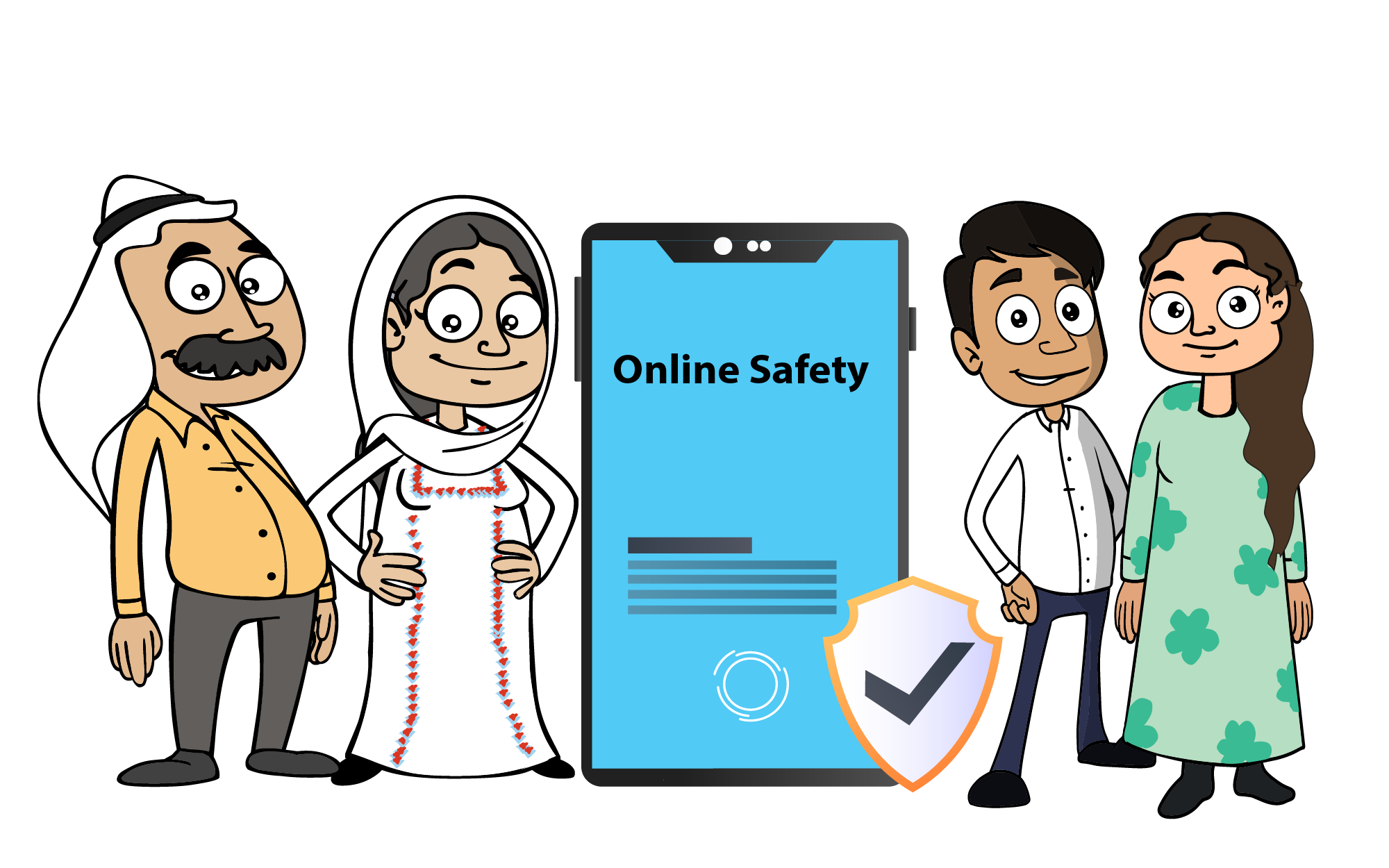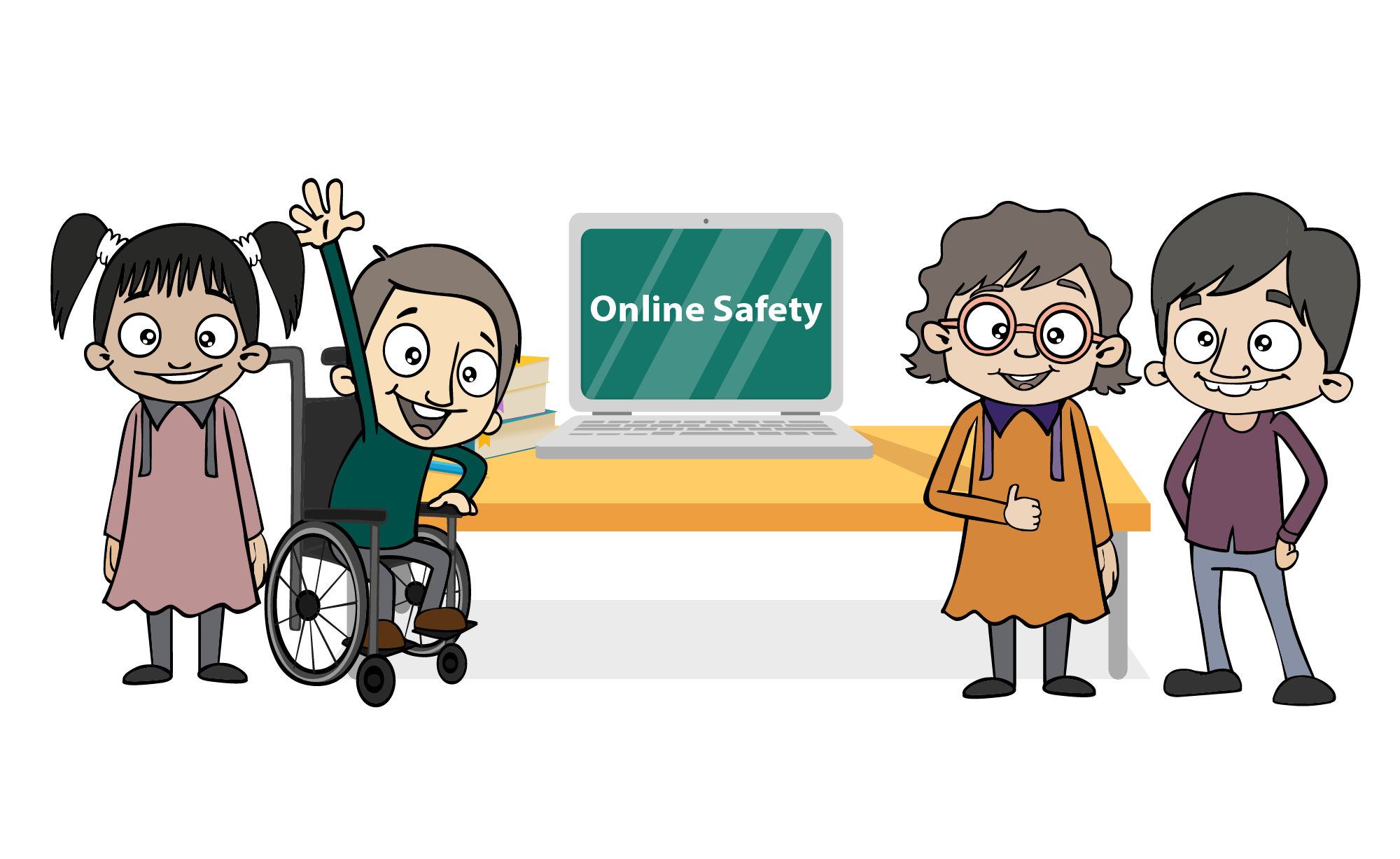Staying Safe Online
Being online is great – lots of new things can be learned and you can have lot of fun. The UNRWA Digital-Learning Platform is particularly designed to help UNRWA students, whatever their age, keep up with their classwork even when it is not possible to go to school every day. Moreover, technology can help us to stay in touch with all our friends, those who live close and those who live far away, too.
But just like when we are not online, there are important things that we all have to keep in mind to ensure our safety.
This site has information about online safety, why it is important and what we can all do, as students, parents, and teachers and other educators to keep ourselves and our loved ones safe online. You can learn more by watching this video!

How to Help Your Child to be Safe Online
For parents and caregivers, it is a priority to ensure that their children are healthy and safe – offline and online. But often the many possibilities, as well as the risks, that come from being online can feel overwhelming and difficult to navigate, for parents and children alike. But the internet can be an excellent way to play, learn, and to interact with others. So, below, there are five easy ways that parents and caregivers can be supported in helping all children enjoy and learn from the internet while ensuring that they stay safe when online. Also, parents/ caregivers are invited to see this short video:
Most devices, applications and even internet browsers offer Parental control settings, or the option to create a designated account for the child, for example if a device is being shared among a number of users. Such settings enable the amount of time that a child can be on screen to be determined and certain apps and websites can also be blocked. The options can vary according to which brand or model of device is being used but normally are located under Settings -> Parental Controls or Accounts. If this is not easy, then the device manual can be checked, or the internet service provider can help.
Many popular sites, such as YouTube, Instagram or Facebook have age restrictions (often it is 13 years). Even though many children below that age probably use these sites, the restrictions are in place for a reason: to keep young people safe. Children should not be allowed to sign up for any sites without some level of parental/adult agreement.
Some parents/caregivers ensure that there are certain spaces or rooms in their home that are “device-free zones”. This way it is easier to monitor online activities and at the same time have space for more personal interaction.
Being online and connected has become a big part of everyone’s life so rather than banning children from using technology, it is probably better, and more, feasible if parents/carers take a genuine interest in any online activities their children are engaged in. In this way they can talk to their child regularly about what they are doing online and be aware of favourite apps and websites that they are using
For parents and caregivers, keeping their children safe from harm must be a number one priority, but it is not possible to be there all the time to protect them. It is therefore crucial that there is open and regular communication between parents and their children so that if there is any problem it is more likely to come out earlier. It is good if parents can discuss what to do if there is a problem with anything online, then if something happens everyone will know what to do. If parents feel unsure how to deal with an incident, it may be useful to talk about it with a teacher, school counsellor or even the police. Moreover, this website will be updated regularly to provide helpful and up-to-date information in this key area.

Staying safe online
Welcome to the Online Safety section of the UNRWA Digital-Learning Platform! This page was designed especially for you as students to learn more about online safety. Over time this section will be developed further, but for now UNRWA has put together five quick recommendations about how to keep safe when being online.
Information such as address, telephone number and especially passwords are personal information. They should never be shared with anyone over the internet or through a social media site. If anyone asks you for this information, you must tell your parents or teacher, or another trusted adult.
If you find something funny or interesting online, or you have taken a good selfie, then you might want to share this with others. This is what social media is all about but always think carefully about whether what you are sharing could be hurtful to someone or even could be damaging to yourself in some way.
It is very important that you treat others the way that you yourself would want to be treated – this is in both the real world, as much as in online space. Always be kind online and do not make anyone feel uncomfortable, hurt of angry.
Sometimes you might receive a message or see posts online that include unknown links. Be careful to NOT click on these without being sure that the link is safe, as they could contain harmful content, or it might be a virus which can affect your device. If in doubt always check with a parent or trusted adult first.
Just like in the real world, you could come across something online that makes you sad or angry, or even scare you. If this happens, you must talk to someone about it, again a parent, an older sibling, a teacher or a school counsellor. They will help you to feel better, but also will know what action to take if there is inappropriate or unsafe content.



